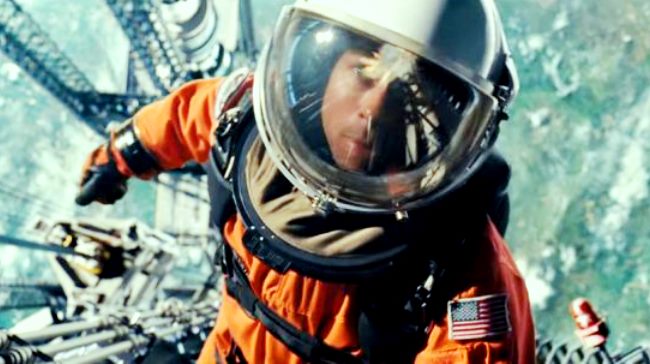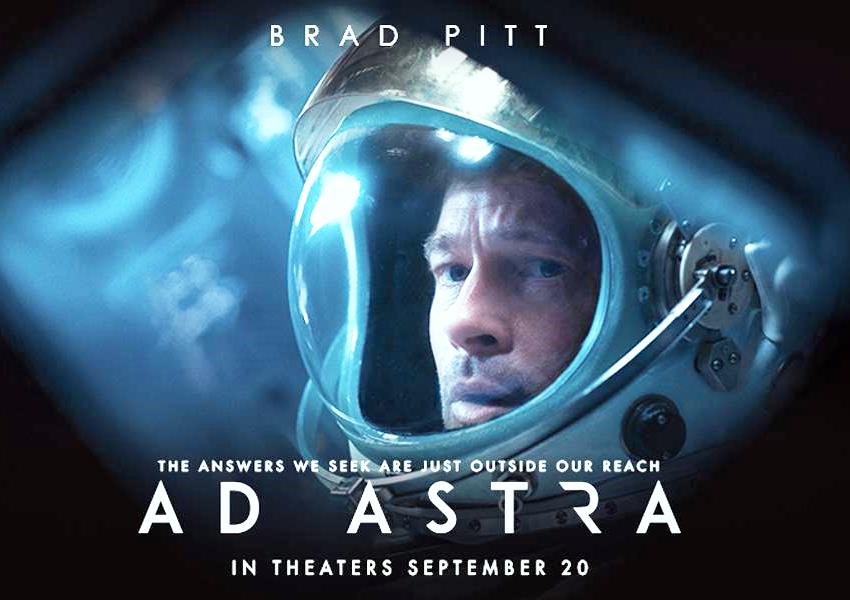
Ad Astra is a gourmet popcorn adventure picture, although some might find it dark and despondent. Set in outer space in the near future, Brad Pitt (as astronaut Roy McBride) is called for top secret duty when it is heard his long lost astronaut father Tommy Lee Jones (as Clifford McBride) has been orbiting around planet Neptune for years, in effort to search for extra-terrestrial life. Question: If Clifford is the last astronaut from that exploration team and hellbent to find intelligent life, why doesn’t he just venture out into a different solar system to look? I got a hazy, half-formed answer to that later.
When it comes to science fiction films set in outer space, there is a genre tradition to push and persuade the science as much as possible even if expository dialogue is needed. I am less persuaded by much of the science in Ad Astra. Instead, there are more hypotheticals to the science here in how astronauts might undertake extraordinary stress in situations that are beyond the common man.
Ad Astra turns out to be a personal story surrounded by hypothetical science and fancy special effects; director James Gray (“The Lost City of Z”), outdoing himself and making this his most splendid work in the twenty years he’s been making films, has Pitt speaking Malickian voice-overs that extol on the loneliness and obsessive inner drives of an astronaut’s life.
Boy, how I love outer space films, I find so many of them beautiful. For me, they never manage to repeat themselves. Sure, the texture of Earth’s atmosphere is like “Gravity” or “Interstellar,” but Gray finds a slightly different way to render the visuals, a slanted camera eye, and he has a knack with gorgeous lens flares or slightly grainy and densely onyx colors to emote the you are there quality to the scenery.
The journey is one of trepidation, from Earth to the Moon and to Mars and beyond, all to stop cabin fevered Clifford from triggering anti-waves from Neptune that is causing power signal failure back on Earth.
The end result to solving all such matters has already frustrated many. Ad Astra does not intend to to the ultimate in outer space theories or advancement in the science fiction genre. It’s more like one of many building blocks. We will see many outer space films in our lifetime and they will all add up in accumulation. You want one that traveled boldly beyond all the others in one thwack? See “Interstellar” again.
But there’s a point to be made here. We may spend several generations out there looking way beyond the stars and never find exactly what we are looking for. To explore space is to pick up little clues that will eventually add up to the mystery of the universe. It’s an adventure to explore, but those chosen to see deep space cannot lose contact with their own humanity.
In Roy’s case, speaking to himself and looking inward will help himself. Knowing he had a self-reflection way to himself made me never lose hope in him. Of course, I mention this all with glee even though it’s a dark, brooding picture where the fate of humanity all hangs in the balance. I feel that way even though it’s more Terrence Malick than Michael Bay. I feel emboldened by James Gray’s maturity as a filmmaker, that excites me and gets me munching on the expensive popcorn.
With Liv Tyler, Donald Sutherland, Loren Dean and Ruth Negga.
123 Minutes. Rated PG-13.
CEREBRAL SCIENCE-FICTION / THINKING TEENS / WEEKEND THRILLER
Film Cousins: “2001: A Space Odyssey” (1968); “Contact” (1997); “Interstellar” (2014); “High Life” (2019).






Recent Comments
rudolfmenon Says,
Totally agree. And we left the cinema really disappointed.
rudolfmenon Says,
Really? Wow, then im going to watch this! I could watch District 9 ...
soulreaver99 Says,
The trailer to the movie itself was half-assed. Totally not surprising that ...
hashbrowny Says,
Great family movie...I disagree with your view. Maybe you've lost your ...
calipoppy Says,
Man of Steel is a Hunk of Kryptonite.I enjoyed the movie.